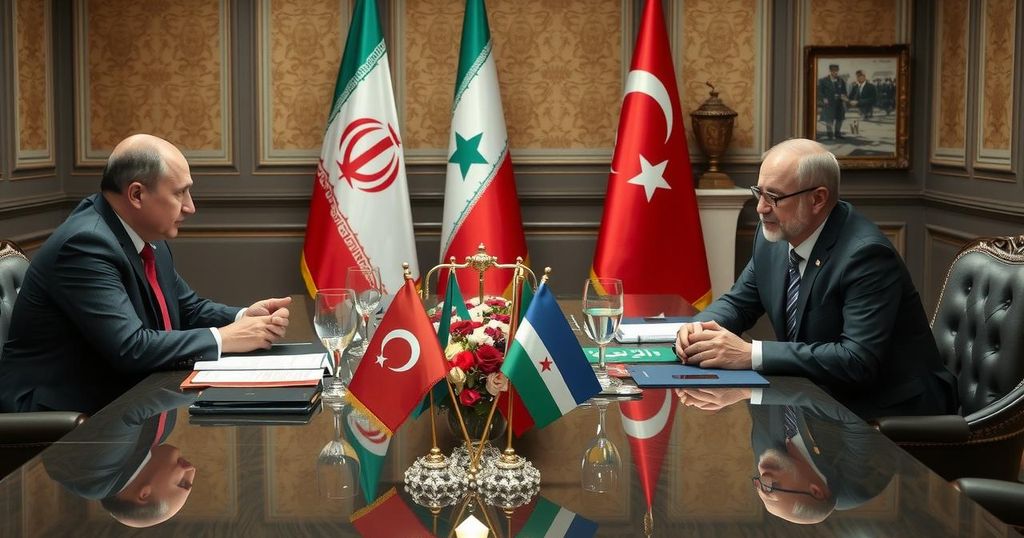This weekend, Turkey, Russia, and Iran will meet in Qatar to address a recent major rebel offensive in Syria that has shifted front lines in the civil war. The talks, occurring during the Doha Forum, reflect ongoing tensions and the complexities surrounding the Syrian conflict, particularly as Islamist groups gain ground, prompting discussions on political solutions and security arrangements in the region.
Turkey, Russia, and Iran are set to convene in Qatar this weekend to deliberate on the implications of a recent significant rebel advance in Syria, which has altered the dynamics of the ongoing 13-year civil conflict. This meeting will be held during the Doha Forum, an international event that gathers high-level officials and leaders from over 150 nations to address shared global issues. Turkey’s Foreign Minister Hakan Fidan will engage with his Russian and Iranian counterparts within the framework of the Astana process, an initiative aimed at facilitating a political resolution to the civil strife that began in 2011.
The Astana process, initiated in 2017, aimed to create a diplomatic pathway for ending the conflict, particularly as Turkey has focused on supporting certain rebel factions, while Russia and Iran back the regime of President Bashar al-Assad. Although a ceasefire brokered by Turkey and Russia in 2020 largely stabilized the fighting and preserved Assad’s control over major territories, recent actions by Islamist rebels, particularly Hayat Tahrir al-Sham (HTS), have raised significant concerns following their capture of Aleppo and advances toward Hama and Homs.
In response to these developments, Russian President Vladimir Putin and Turkish President Recep Tayyip Erdogan emphasized the necessity for ending hostilities against the Syrian state, while simultaneously recognizing the Assad regime’s obligation to pursue political solutions. Ankara remains vigilant about the potential strengthening of Kurdish forces in northern Syria, associated with the U.S.-backed Syrian Democratic Forces (SDF), which Turkey views as a security threat.
As these factions clash amidst the breakdown of prior ceasefires, the situation complicates existing geopolitical alliances. The current military actions by HTS could prompt reconsideration among Assad’s allies, as U.S. officials suggest that such developments might influence calls for compromise. However, analysts express skepticism regarding Russia and Iran’s willingness to abandon their support for Assad.
The United States has maintained a presence in Syria, focusing on the fight against ISIS, while supporting the SDF in their operations against both the Islamic State and the Assad regime. The White House has attributed the escalating crisis to Assad’s failure to engage politically, with some advocates warning against the resurgence of ISIS in the region as chaos unfolds. U.S. Secretary of State Antony Blinken has highlighted the critical importance of preventing any revival of the ISIS caliphate, especially in light of recent threats.
The Syrian civil war has persisted for over a decade, with complex geopolitical dimensions involving various state and non-state actors. Since 2011, the conflict has shifted through numerous phases, involving multiple ceasefires and attempts at political resolution, notably through the Astana process initiated in 2017 by Turkey, Iran, and Russia. Recently, the escalation of violence by Islamist factions has threatened existing power structures, raising alarm within the international community about regional stability and the ongoing humanitarian crisis stemming from the conflict. As the dynamics evolve, the positions of the supporting nations will be crucial in determining the future of Syrian governance and stability.
The upcoming talks among Turkey, Russia, and Iran signify a critical juncture in the Syrian civil war’s ongoing evolution. The recent advances by HTS rebels have disrupted previous stability and complicate the diplomatic landscape shaped by the Astana process. As various actors re-evaluate their strategies in response to the changing front lines and the potential re-emergence of terrorist threats like ISIS, the outcome of these discussions will have significant ramifications for Syria’s future and its neighboring regions.
Original Source: www.voanews.com






